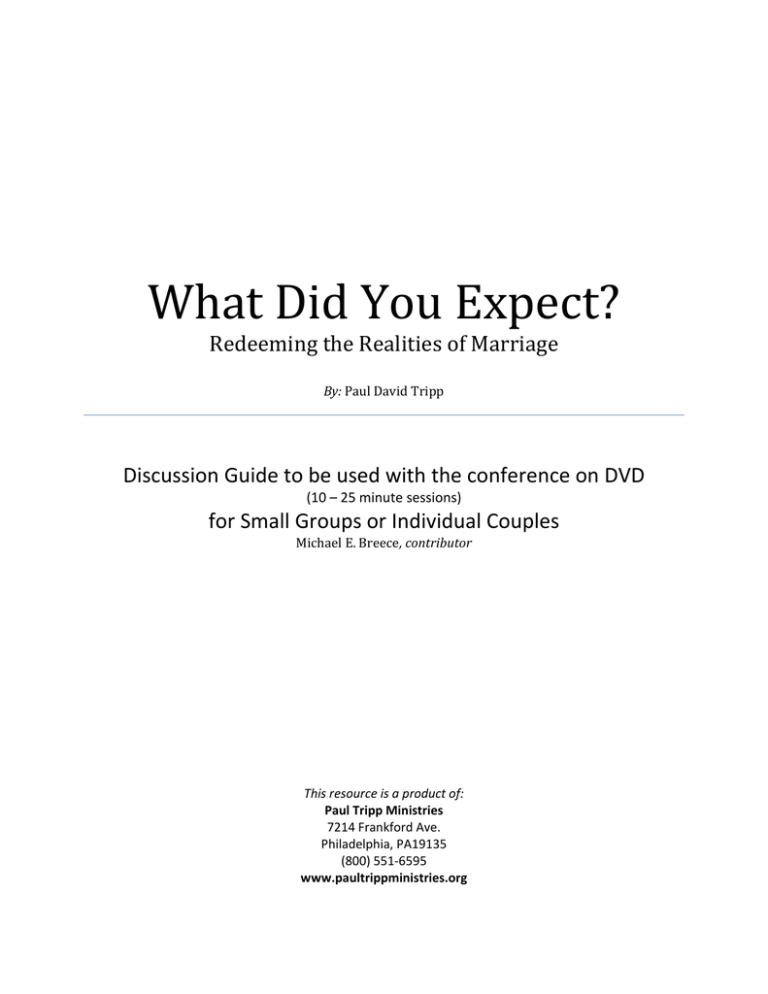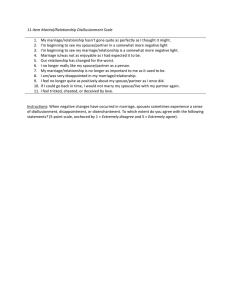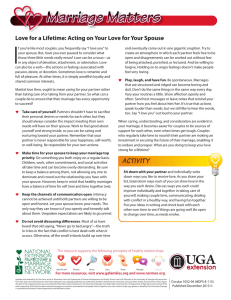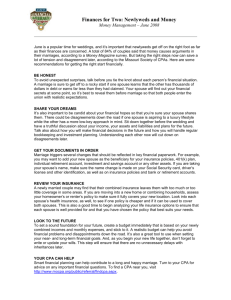
What Did You Expect?
Redeeming the Realities of Marriage By: Paul David Tripp Discussion Guide to be used with the conference on DVD
(10 – 25 minute sessions) for Small Groups or Individual Couples Michael E. Breece, contributor
This resource is a product of: Paul Tripp Ministries 7214 Frankford Ave. Philadelphia, PA19135 (800) 551‐6595 www.paultrippministries.org What Did You Expect?
Redeeming the Realities of Marriage INTRODUCTION
The following pages provide practical discussion and application of Christ-centered, biblical
ideas applied to marriages. Using the guide within a small group setting is greatly
worthwhile. Couples will be able to see that their challenges in marriage are not unique and
group members can play a role in accountability, encouragement or even confrontation. If
you do not have a small group to participate in, consider inviting couples to join you in
going through this material. Otherwise, it can be used by a couple on their own.
Whether as a small group or as an individual couple, set aside a time to work through the
material. Having a small group will probably make it easier to keep that time a priority. If
you are doing the material as a small group, also set aside a time as an individual couple to
answer the JUST BETWEEN THE TWO OF YOU sections in each session.
The study is designed for participants to write down their answers and thoughts. It is useful
to write out answers and not just think about them. Writing deepens and clarifies our
thinking; and writing it down acts as a stronger form of commitment than just saying it in
our thoughts.
There are a variety of application questions. Some work well as discussion questions to
answer and consider together; others are best considered individually within one’s own
thoughts. A time of prayer together after answering the application questions--corporately
or individually--can be a good way to reinforce them and to make further application. Prayer
can be a way for you to make a commitment to God with what you want to apply, and a
good way to hear what God may be saying to you.
As you share your thoughts, feelings, struggles, and accomplishments, speak humbly,
honestly, and in love. We all have sin; we all have great value in God’s sight; and we all
are on a journey growing and becoming more like Christ. May God bless you greatly!
2 What Did You Expect?
Redeeming the Realities of Marriage SESSION 1
Opening Discussion: What ideas are implied in the title of this study? Take a moment and list what you think could be five essential ingredients for a good marriage. If you had to choose only one essential ingredient, what would it be? Scripture Passage: Luke 6:43‐45 KEY POINTS:
God cares about the little moments of your life because life mostly consists of “little moments”; therefore, the character of your marriage will be defined by how you respond and make use of little moments. 3
A marriage of unity, understanding and love is not rooted in romance; it is rooted in worship. o Romance is a result of a good marriage; not the cause of a good marriage.
Everything you do and say is the result of some kind of worship. Everything you do and say is caused by what is inside of you.
What comes out of us is what was already inside our hearts. o The heart is the causal source of your personhood—the source of your thoughts, feelings, desires, and motivations. DISCUSSION 1. Why does God care about the small, mundane moments of life? 2. What does it mean to say romance is not the cause of a good marriage? How has our culture taught us that romance is the cause for a good relationship? 3. In what way is worship first our identity before it is ever our activity? 4. What does Dr. Tripp mean when he says that we “live out of the heart”? 5. Why is it important that we recognize the greatest source of our marriage conflicts come from inside of us? APPLICATION Write two or three things you tend to blame your responses and behavior on? Share your answers. What actions or responses would you like to change in yourself? Identify types of conflict in your marriage (money, parenting, time management, communication, intimacy, daily concerns, etc). What tends to flow from your heart when these times of “shaking” occur? Are you willing to identify and confess any sin to God and to your marriage partner? 4 In Psalm 139 David asks God to search and know his heart, to see if there is any offensive ways in him. Pray to God for the same thing, asking God to show you your heart. JUST BETWEEN THE TWO OF YOU Sit together as a couple. Pray together asking God to reveal what he wants to change in your heart. Share what actions or responses flow from your heart that you would like to see changed. Ask your spouse for forgiveness for any wrong and sinful responses/actions you have allowed. Further Reading 1 Kings 8:27‐53 (as you read, consider the fact that you are the temple of God‐1 Cor 6:19) 5 SESSION 2
Opening Discussion/Review: A marriage of unity, understanding and love is rooted in what? How did you do in the little moments of life? What flowed from your heart when life shook you up? Scripture Passages: Luke 6:43‐45; Romans 1:18‐25 KEY POINTS Marriage problems are first heart problems before they are behavior problems or communication problems; therefore we must focus on our hearts to bring change and reconciliation to marriage problems. We attach our identity—our meaning and purpose, our sense of well‐being—to something: either the Creator or the creation. o Sin causes us to exchange worship and service of the Creator for worship and service of the creation. What rules your heart will always exercise control over your life and your behavior. A desire for a good thing becomes a bad thing when that desire becomes a ruling thing. DISCUSSION 1. What is “apple nailing”? 2. What are the two categories that define what we may attach ourselves to? 3. What does it look like to find your identity in created things? 4. How does sin influence our attachments? 6 APPLICATION Are you willing to confess, “I am the greatest source of my marriage problems”? If so, circle that statement. If you think you are not, write the name of a person you can speak openly with and receive counsel. Name of person: When I will call to share with this person: Write below what you think is the source of your marriage problems: What are you most tempted to attach your identity to? Success, comfort, acceptance, work, family, friends, God, other? What have you allowed to rule you? Consider a typical day in your life. If you don’t know answers to these, are you willing to ask your spouse his/her opinion? o Most of my time is spent Do I think this is how God wants me to use this amount of time? o If I could shift the use of my time, I would spend more time o Other than food, necessary clothing and shelter, most of my money is spent on Do I think this how God wants me to use that money? o If I could shift the use of my money, I would use/give it to o I often show the greatest amount of anger, impatience, or discontentment over JUST BETWEEN THE TWO OF YOU Sit down together as a couple. Pray together asking God to make you willing to listen and accept your spouse’s observations. Invite your spouse to share with you what he/she believes has a ruling influence—other than God‐‐in your life. If you didn’t share any of your answers in your small group, share them now with one another. Further Reading Luke 16:13‐15; Isaiah 44:9‐20 (note especially verse 20)
7 SESSION 3 Opening discussion/Review How do our hearts, our worship and our relationships tie together? What tends to rule your heart? In what are you tempted to find your identity? Scripture Passages: James 4:1‐2; Corinthians 5:14 KEY POINTS Conflicts arise because of the desires that battle within our hearts‐‐we get angry because others get in the way of our desires. o We are torn between desires for God’s kingdom and our own kingdom. Whatever set of desires rules my heart, shapes my responses to others. Sin causes us to shrink our lives to the size of our lives. Sin causes me to turn my focus away from God and onto myself. DISCUSSION 1. How does sin lead to conflict within marriage? 8 APPLICATION Make a list of desires that often battle within us. What would it look and sound like if we desire God’s kingdom’s purposes rather than our own? Is your love for your spouse a biblical love or a self‐centered love? Pray together and ask God to make your love for your spouse Kingdom‐centered. JUST BETWEEN THE TWO OF YOU Ask your children or someone else who knows you well and will be honest, “What would you say is the most important thing to me?” Is the answer what you want to be the most important thing? Set up a code word or phrase with your spouse that will remind you of sin’s influence. For example, the phrase could be “What are you desiring?” When you get angry about something, your spouse will ask, “What are you desiring?” and this will remind you that you want to desire God’s will and to serve his kingdom purposes, rather than your own. Further Reading: Romans 6:12‐14; Luke 9:48; Matthew 18:4, 20:25‐28, 23:1‐28
9 SESSION 4 Opening discussion/Review What things or situations tend to make you anxious? Scripture Passage: Matthew 6:19‐34 KEY POINTS We all need to continue to be freed from self desires. The selfishness of sin dehumanizes the people in my life. They are reduced to vehicles to help me get what I want or obstacles that get in the way of what I want. Marriage this side of heaven will always be a war between two kingdoms—God’s kingdom and the kingdom of self. Everyone lives for some kind of treasure. o The thing that is your treasure will control your heart. What controls your heart will control your behavior. Worldly self‐ascribed treasures are found in things we want (earth‐bound treasures) and in things we think we need (anxiety‐bound needs). Fixing problems in marriage must begin with my relationship with God. DISCUSSION 1. What are the treasures God desires us to live for? 2. How do we use or expect others to serve our pursuit of worldly treasure? 10 3. Why should we not live for earth‐bound treasures or anxiety‐bound needs? APPLICATION If someone watched a video of your last month, what would be seen to be your treasure? JUST BETWEEN THE TWO OF YOU Make a decision to live for God’s will and His kingdom. Next time there is conflict in your marriage, stop and decide together to desire God’s will instead of your own. Further Reading: Luke 12:13‐34; Psalm 62
11 SESSION 5 Opening discussion/Review: In what way is marriage a war? KEY POINTS Our kingdom of self can masquerade as the kingdom of God. Sin makes it difficult to keep important things as important things. You will never know the peace of the King if you are trying to be the king; peace will begin by admitting that you have a problem with wanting your own kingdom more than God’s. DISCUSSION 1. What does it mean when Dr. Tripp says the kingdom of self masquerades as the kingdom of God? 2. Make a list of things that are important in serving God’s kingdom. APPLICATION Where have unimportant things become all too important in my life that have created conflict with people in my life? JUST BETWEEN THE TWO OF YOU Share with your spouse things you would like to replace on your “importance list”—(that is, what things have become more important than they should be and what things have not been given the importance you want them to have?). Ask and then allow your spouse to hold you accountable to these decisions. Further reading: Philippians 4:4‐9; Colossians 3:1‐17; 2 Corinthians 4:18
12 SESSION 6 A Means to an End Opening discussion/Review: What are some things you and your spouse have agreed to hold each other accountable to in regards to keeping important things important? What do you think might be God’s purpose in marriage? Scripture Passage: Galatians 5:13‐15 KEY POINTS Marriage is a relationship between two flawed people in a fallen world but with a faithful God. It is God’s purpose to use marriage in his process of sanctification. o Happiness is not to be the end result of marriage; rather marriage is the process by which we grow to be more like Christ. o Our spouses are present to influence us toward godliness. Each marriage partner is an agent of God for the other person’s growth. o God’s purpose in marriage is greater than just your happiness. 13
Improving our love in marriage begins with improving our love for God.
Unity in marriage begins with making God’s purposes my purposes. Peace in marriage begins when I allow God to rule my life. DISCUSSION Why does sanctification need to be so difficult? Why does it involve conflict? Define the Kingdom of Self. Define the Kingdom of God. APPLICATION: If you are working through this material as a small group, consider splitting up into groups of men and groups of women to answer the following application questions. What kind of influence have you had on your spouse? Has your relationship with your spouse improved over the years or worsened? How has your spouse changed? Are you willing to accept responsibility for the growth and character of your spouse? Do you take your marriage relationship for granted? Do you do things now that you would not have done when you were courting? How can you extend grace and biblical love toward your spouse? Are you a servant to your spouse? JUST BETWEEN THE TWO OF YOU Pray together. Ask each other, “Have I been a godly and positive influence in your life?” Ask your spouse how you can minister and serve better? Share with each other what you believe God is working on in your individual life. Talk about what you believe God is working on in your life as a couple. Further Reading: Ephesians 4:11‐16; Philippians 2:3‐14 14 SESSION 7
Opening discussion/Review Were your actions and words this week more consistent with your kingdom of self or with the kingdom of God? What do you do to show love for your spouse? In the passage below, underline the ideas that describe love. 7Dear friends, let us love one another, for love comes from God. Everyone who loves has been born of
God and knows God. 8Whoever does not love does not know God, because God is love. 9This is how God
showed his love among us: He sent his one and only Son[a] into the world that we might live through him.
10This is love: not that we loved God, but that he loved us and sent his Son as an atoning sacrifice for[b]
our sins. 11Dear friends, since God so loved us, we also ought to love one another. 12No one has ever
seen God; but if we love one another, God lives in us and his love is made complete in us.
13We know that we live in him and he in us, because he has given us of his Spirit. 14And we have seen
and testify that the Father has sent his Son to be the Savior of the world. 15If anyone acknowledges that
Jesus is the Son of God, God lives in him and he in God. 16And so we know and rely on the love God has
for us. God is love. Whoever lives in love lives in God, and God in him. 17In this way, love is made
complete among us so that we will have confidence on the day of judgment, because in this world we are
like him. 18There is no fear in love. But perfect love drives out fear, because fear has to do with
punishment. The one who fears is not made perfect in love.
19We love because he first loved us. 20If anyone says, "I love God," yet hates his brother, he is a liar.
For anyone who does not love his brother, whom he has seen, cannot love God, whom he has not seen.
21And he has given us this command: Whoever loves God must also love his brother.
Scripture Passage: 1 John 4:7‐21 KEY POINTS The quality of your love for God can be measured by the love you have for others. The sacrifice of Christ on the cross defines love o therefore love is a willing self‐sacrifice for the good of another that doesn’t demand reciprocation or that the person being loved is deserving. We are called to love regardless of the other’s sin or the circumstances. DISCUSSION 1. What is the connection between your love for God and the love you show to others? 2. Why is real love willing, sacrificial, and unconditional? 15 APPLICATION: If you are working through this material as a small group, consider splitting up into groups of men and groups of women to answer the following application questions. What things are you sometimes unwilling to sacrifice in order to love your spouse? Do you experience joy when you have an opportunity to willingly sacrifice for your spouse? If not, identify why. Are you willing to love your spouse regardless of whether your spouse reciprocates? What could you do this week to show sacrificial love to your spouse? JUST BETWEEN THE TWO OF YOU Share with each other the benefits you have gained from Christ’s sacrifice on the cross. You can look together at the passages under Further Reading. Pray together giving thanks to God for the sacrifice of his Son for our sins. Ask each other, “What can I do to show you greater love?” Further Reading Titus 3:3‐6; Ephesians 2:1‐10 16 SESSION 8 Opening discussion/Review: If you split into men and women groups last session, consider returning to those groups for the opening discussion. This will allow each an opportunity for accountability based on last session’s answers. What does it mean to love? How well are you loving your spouse? Did you show your spouse love as you said you would last session? Scripture Passage: 1 John 4:7‐21 KEY POINTS To love others as God desires us to can be done because God gives us his grace. o God sent his son to rescue us from self‐love so that we can love others as he intends us to love. We were designed to love. o Problems arise when we do not do what we were created to do. Love for others is motivated by gratitude for God’s love for me—a desire to give to others what has been given to me. DISCUSSION 1. How can we possibly love those who can be so difficult to love? 2. How is worship of God the root of bringing love, unity and understanding into our marriage? 3. How does the promise in 2 Peter 1:3 give us hope about loving as we ought to love? APPLICATION Loving others begins with understanding and accepting God’s love. Do you struggle with believing or accepting God’s love? If so, why? What untruths need to be changed or what sins do you need to ask God to forgive? Read the passages in Further Reading to help you understand and fully grasp God’s love for you. 17 JUST BETWEEN THE TWO OF YOU The next time you have conflict in your marriage, agree to pray together asking for God’s grace. If you forget or choose not to pray, be sure to ask the other and God for forgiveness. Further Reading Luke 7:36‐50; Romans 5:6‐11; Romans 8:31‐39; Zephaniah 3:17; Ephesians 5:25‐33 18 SESSION 9 Opening discussion/Review Why is it sometimes difficult to love others? Scripture Passage: Acts 17:24‐28 19 KEY POINTS In order to love others as God intends me to, I must worship God as Creator. o God has purposefully made us different. In order to love others as God intends me to, I must worship God as Sovereign. o God has purposefully placed us together. DISCUSSION 1. How does worshipping God as Creator help me love others? 2. What is God’s purpose in making us different? 3. How does worshipping God as Sovereign help me love others? 4. What is God’s purpose in placing us with our spouses? (think back to session 6 ) APPLICATION What aspects of your spouse’s “hard wiring” have you been critical of that you need to accept as God’s creation? Share with your group or reminisce with your spouse how God brought the two of you together. How has God used your spouse to make you more like Christ? JUST BETWEEN THE TWO OF YOU Sit down together. Pray together. Share with your spouse what you appreciate about him/her. Share with your spouse how God has used him/her in your life. Share with your spouse an area where you feel unappreciated or criticized by him/her. Further Reading: Psalm 139:1‐16
20 SESSION 10 Opening discussion/Review: What do you do when your spouse sins against you? How does God respond to you when you sin? KEY POINTS In order to love others as God intends me to, I must worship God as Savior. It is God’s intention to make change a process and not an event. It is God’s intention as Savior to use me as an instrument in His work of change. God’s grace, patience, and compassion in my life should be equally offered by me to others as well. If you do not worship God as Creator, Sovereign and Savior you will turn moments of ministry into moments of anger because you will make everything about yourself and you will settle for quick situational solutions instead of getting to the heart of the matter. DISCUSSION 1. How are we God’s instrument in our spouse’s life? 2. How can we show grace to our spouse as God shows grace? APPLICATION Who are some people in your life God has used to make you more like Christ? How were they used by God? 21 What practical things can be done to help us focus on our own hearts when moments of conflict arise? In light of all you have heard and learned, explain why a marriage of unity, understanding and love is not rooted in romance but is rooted in worship. JUST BETWEEN THE TWO OF YOU Sit down together and pray thanking him for the work he is doing in you. Invite your spouse to be an instrument of God’s grace in your life. As an instrument of God’s grace, ask your spouse how you can best be used by God in his/her life. Further Reading: Philippians 1:3‐6; 1 Corinthians 1:4‐9 This resource is a product of: Paul Tripp Ministries 7214 Frankford Ave. Philadelphia, PA19135 (800) 551‐6595 www.paultrippministries.org 22 Scripture taken from the HOLY BIBLE, NEW INTERNATIONAL VERSION®. NIV®. Copyright©
1973, 1978, 1984 by International Bible Society. Used by permission of Zondervan. All
rights reserved. 23




